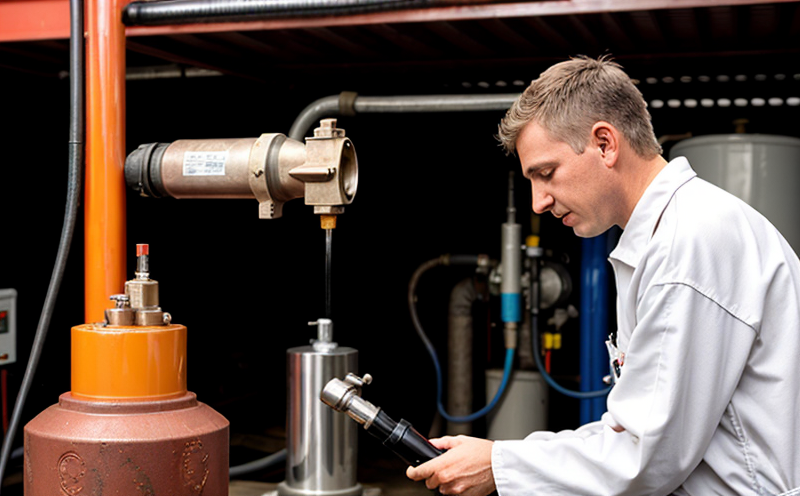ASTM D7096 Micro-Separometer Water Separation Testing
The ASTM D7096 Micro-Separometer water separation test is a critical procedure for assessing the ability of aviation fuel to separate water from its oil phase. This service ensures that fuels meet stringent quality standards, which are crucial for preventing engine-related failures and ensuring safe operations in aerospace applications.
Water contamination can lead to microbial growth within fuel systems, causing degradation of lubricants and potential blockages in filters. The ASTM D7096 test provides a reliable method to measure the efficiency with which water is separated from aviation fuels at various temperatures. This capability ensures that fuels are safe for use under diverse operational conditions.
The Micro-Separometer apparatus used in this testing process involves a cylindrical container where fuel samples are introduced along with distilled water. The mixture undergoes centrifugation to separate the phases, and the results are visually recorded and quantified according to ASTM D7096 standards. Compliance with these standards is essential for maintaining fuel quality that meets international aviation regulations.
The testing procedure typically starts with precise sample preparation, including ensuring the sample is free from particulates that could interfere with accurate measurements. The prepared samples are then introduced into the Micro-Separometer apparatus according to the protocol specified in ASTM D7096. Once separation occurs, the results are analyzed using visual inspection or automated recording systems to determine the amount of water retained by the fuel.
This testing service is not only beneficial for ensuring the quality and reliability of aviation fuels but also plays a pivotal role in preventing costly disruptions in operations. By adhering strictly to ASTM D7096 guidelines, this test ensures that fuels are fit for purpose, reducing risks associated with water contamination and microbial growth.
For quality managers, compliance officers, R&D engineers, and procurement professionals involved in the aerospace sector, understanding these tests is vital. The results of such testing directly influence decisions regarding fuel procurement, storage, and usage protocols, thereby enhancing overall safety and operational efficiency in aviation operations.
Benefits
Reduces the risk of microbial growth within fuel systems.
Ensures compliance with international aviation standards and regulations.
Improves fuel quality by eliminating water contamination, which can degrade lubricants.
Promotes operational safety in aircraft engines and associated components.
The ASTM D7096 test is an essential tool for maintaining the integrity of aviation fuels, ensuring they meet stringent quality criteria required for safe and reliable operations. This testing service not only enhances fuel performance but also contributes significantly to reducing maintenance costs and downtime due to fuel-related issues.
Quality and Reliability Assurance
The ASTM D7096 Micro-Separometer water separation test plays a crucial role in maintaining the quality and reliability of aviation fuels. By ensuring that fuels are free from excess water contamination, this testing service contributes to several key aspects:
Reduces the risk of microbial growth within fuel systems.
Prevents blockages caused by water in filters and other critical components.
Achieves compliance with international aviation standards such as ASTM D7096, enhancing overall operational safety.
Maintains fuel quality over extended storage periods, ensuring consistent performance across various environmental conditions.
Through this rigorous testing process, the service ensures that fuels are fit for purpose and capable of withstanding the demands placed on them during aircraft operations. This not only enhances safety but also supports long-term cost savings by minimizing maintenance needs and fuel-related disruptions.
Use Cases and Application Examples
| Scenario | Description |
|---|---|
Aircraft Maintenance Routine |
Determine the water separation capability of fuels used in routine maintenance to ensure they meet operational standards. |
New Fuel Batch Acceptance |
Validate that newly received fuel batches comply with ASTM D7096 standards before use in aircraft engines. |
Storage Facility Quality Check |
Evaluate the quality of stored fuels after a specified period to ensure they remain fit for purpose during extended storage. |
R&D Prototyping |
Assess the water separation efficiency of prototype fuel blends before full-scale deployment in aircraft engines. |
Supply Chain Quality Assurance |
Ensure that fuels supplied by different vendors meet uniform quality standards as per ASTM D7096 guidelines. |
The ASTM D7096 Micro-Separometer water separation test is widely used across various scenarios in the aerospace industry, from routine maintenance to R&D prototyping. These applications underscore its importance in maintaining fuel quality and reliability, which are paramount for safe and efficient aircraft operations.





